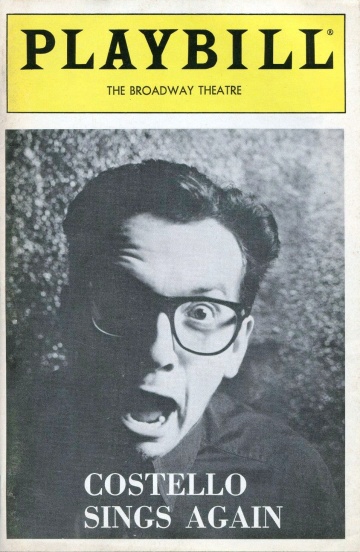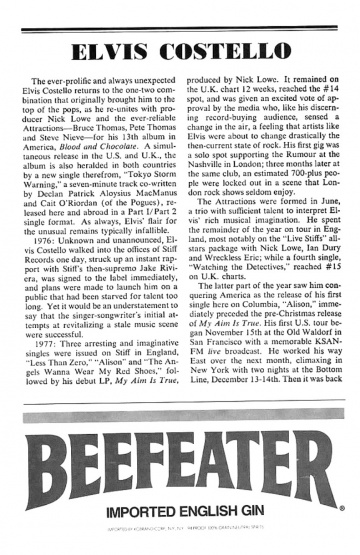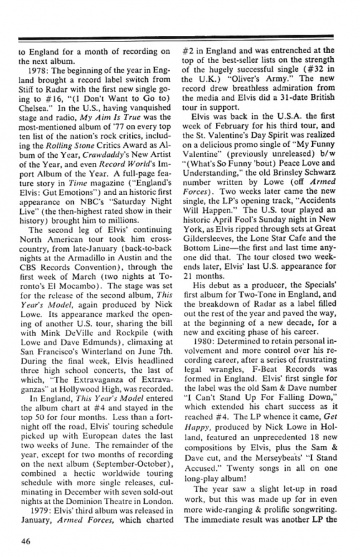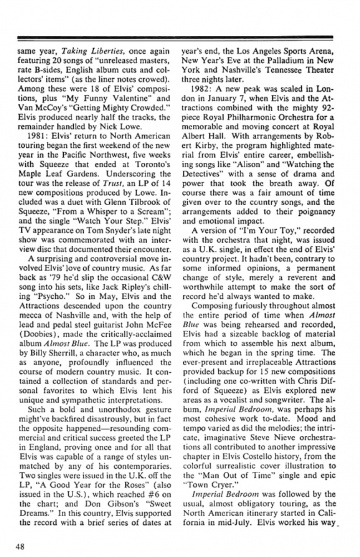Playbill, October 1986: Difference between revisions
(start page) |
(+text part 1) |
||
| Line 10: | Line 10: | ||
---- | ---- | ||
{{Bibliography text}} | {{Bibliography text}} | ||
The ever-prolific and always unexpected Elvis Costello returns to the one-two combination that originally brought him to the top of the pops, as he re-unites with producer Nick Lowe and the ever-reliable Attractions — Bruce Thomas, Pete Thomas and Steve Nieve — for his 13th album in America, ''Blood and Chocolate''. A simultaneous release in the U.S. and U.K., the album is also heralded in both countries by a new single therefrom, "Tokyo Storm Warning," a seven-minute track co-written by Declan Patrick Aloysius MacManus and Cait O'Riordan (of the Pogues), released here and abroad in a Part I/Part 2 single format. As always, Elvis' flair for the unusual remains typically infallible. | |||
1976: Unknown and unannounced, Elvis Costello walked into the offices of Stiff Records one day, struck up an instant rapport with Stiff's then-supremo Jake Riviera, was signed to the label immediately, and plans were made to launch him on a public that had been starved for talent too long. Yet it would be an understatement to say that the singer-songwriter's initial attempts at revitalizing a stale music scene were successful. | |||
1977: Three arresting and imaginative singles were issued on Stiff in England. "Less Than Zero," "Alison" and "The Angels Wanna Wear My Red Shoes." followed by his debut LP, ''My Aim Is True'', produced by Nick Lowe. It remained on the U.K. chart 12 weeks, reached the #14 spot, and was given an excited vote of approval by the media who, like his discerning record-buying audience, sensed a change in the air, a feeling that artists like Elvis were about to change drastically the then-current state of rock. His first gig was a solo spot supporting the Rumour at the Nashville in London; three months later at the same club, an estimated 700-plus people were locked out in a scene that London rock shows seldom enjoy. | |||
The Attractions were formed in June, a trio with sufficient talent to interpret Elvis' rich musical imagination. He spent the remainder of the year on tour in England, most notably on the "Live Stiffs" all-stars package with Nick Lowe, Ian Dury and Wreckless Eric; while a fourth single, "Watching the Detectives," reached #15 on U.K. charts. | |||
The latter part of the year saw him conquering America as the release of his first single here on Columbia, "Alison," immediately preceded the pre-Christmas release of ''My Aim Is True''. His first U.S. tour began November 15th at the 04 Waldorf in San Francisco with a memorable KSAN-FM live broadcast. He worked his way East over the next month, climaxing in New York with two nights at the Bottom Line, December 13-14th. Then it was back to England for a month of recording on the next album. | |||
1978: The beginning of the year in England brought a record label switch from Stiff to Radar with the first new single going to #16, "(I Don't Want to Go to) Chelsea." In the U.S., having vanquished stage and radio, ''My Aim Is True'' was the most-mentioned album of '77 on every top ten list of the nation's rock critics, including the <i>Rolling Stone</i> Critics Award as Album of the Year, <i>Crawdaddy</i>'s New Artist of the Year, and even <i>Record World</i>'s Import Album of the Year. A full-page feature story in ''Time'' magazine ("England's Elvis: Gut Emotions") and an historic first appearance on NBC's ''Saturday Night Live'' (the then-highest rated show in their history) brought him to millions. | |||
The second leg of Elvis' continuing North American tour took him cross-country, from late-January (back-to-back nights at the Armadillo in Austin and the CBS Records Convention), through the first week of March (two nights at Toronto's El Mocambo). The stage was set for the release of the second album, ''This Year's Model'', again produced by Nick Lowe. Its appearance marked the opening of another U.S. tour, sharing the bill with Mink DeVille and Rockpile (with Lowe and Dave Edmunds), climaxing at San Francisco's Winterland on June 7th. During the final week, Elvis headlined three high school concerts, the last of which, "The Extravaganza of Extravaganzas" at Hollywood High, was recorded. | |||
In England, ''This Year's Model'' entered the album chart at #4 and stayed in the top 50 for four months. Less than a fortnight off the road, Elvis' touring schedule picked up with European dates the last two weeks of June. The remainder of the year. except for two months of recording on the next album (September-October), combined a hectic worldwide touring schedule with more single releases, culminating in December with seven sold-out nights at the Dominion Theatre in London. | |||
1979: Elvis' third album was released in January, ''Armed Forces'', which charted #2 in England and was entrenched at the top of the best-seller lists on the strength of the hugely successful single (#32 in the U.K.) "Oliver's Army." The new record drew breathless admiration from the media and Elvis did a 31-date British tour in support. | |||
Elvis was back in the U.S.A. the first week of February for his third tour, and the St. Valentine's Day Spirit was realized on a delicious promo single of "My Funny Valentine" (previously unreleased) b/w "(What's So Funny 'bout) Peace Love and Understanding," the old Brinsley Schwarz number written by Lowe (off ''Armed Forces''). Two weeks later came the new single, the LP's opening track, "Accidents Will Happen." The U.S. tour played an historic April Fool's Sunday night in New York, as Elvis ripped through sets at Great Gildersleeves, the Lone Star Cafe and the Bottom Line — the first and last time anyone did that. The tour closed two weekends later, Elvis' last U.S. appearance for 21 months. | |||
His debut as a producer, the Specials' first album for Two-Tone in England, and the breakdown of Radar as a label filled out the rest of the year and paved the way, at the beginning of a new decade, for a new and exciting phase of his career. | |||
1980: Determined to retain personal involvement and more control over his recording career, after a series of frustrating legal wrangles, F-Beat Records was formed in England. Elvis' first single for the label was the old Sam & Dave number "I Can't Stand Up For Falling Down," which extended his chart success as it reached #4. The LP whence it came, ''Get Happy'', produced by Nick Lowe in Holland, featured an unprecedented 18 new compositions by Elvis, plus the Sam & Dave cut, and the Merseybeits "I Stand Accused." Twenty songs in all on one long-play album! | |||
The year saw a slight let-up in road work, but this was made up for in even more wide-ranging & prolific songwriting. The immediate result was another LP the | |||
{{cx}} | {{cx}} | ||
{{rttc}} | |||
{{Bibliography notes header}} | {{Bibliography notes header}} | ||
Revision as of 22:50, 19 November 2016
|



